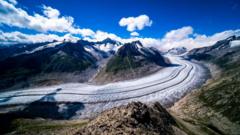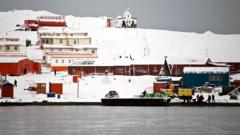Research indicates that glaciers worldwide have lost over 6,500 billion tonnes of ice since 2000, with the pace of melting accelerating. This trend poses significant threats to freshwater supplies and sea-level stability, stressing the importance of immediate action on reducing greenhouse gas emissions.
Accelerating Glacier Melt Signals Urgent Climate Crisis

Accelerating Glacier Melt Signals Urgent Climate Crisis
A new study reveals that global glaciers are melting at an unprecedented rate, underscoring the urgent need to address climate change.
The world's glaciers are now melting at an alarming rate, with new research highlighting unprecedented losses tied to climate change. The comprehensive study reveals that glaciers, which serve as vital freshwater sources, have shed over 6,500 billion tonnes of ice – equivalent to about 5% of their volume – since the year 2000. Alarmingly, the rate of melting has increased significantly, with losses over the past decade alone exceeding those recorded between 2000 and 2011 by more than a third.
The research, encompassing over 230 regional estimates from 35 different research teams, offers the most reliable data on the situation. It demonstrates how glaciers, often referred to as ‘frozen rivers of ice,’ are clear indicators of the changing climate. Under stable conditions, these glaciers maintain a balanced size by gaining roughly as much ice from snowfall as they lose from melting. However, rising global temperatures linked to human activities, particularly the burning of fossil fuels, have disrupted this delicate balance.
Specifically, between 2000 and 2023, glaciers, excluding the major ice-sheets of Greenland and Antarctica, lost an average of 270 billion tonnes of ice each year. To put this number in perspective, it equates to the water consumption of the entire global population over the span of 30 years. The extent of glacier loss varies by region, with Central Europe experiencing a staggering 39% reduction in ice volume within just two decades.
The novelty of this study, published in the journal Nature, lies not only in the alarming confirmation of melting rates but also in its collaborative approach. By combining multiple research methodologies, ranging from field measurements to satellite data, scientists are now able to draw firmer conclusions about glacier behavior and the overarching climate crisis.
Experts highlight that glacier melting has repercussions far beyond local ecosystems. Hundreds of millions depend on glacier meltwater for their water supply, especially during droughts. The loss of glaciers would eliminate this critical water resource, impacting food security and drinking water availability.
As global sea levels have already risen by over 20 centimeters since 1900, further melting of glaciers could exacerbate coastal flooding and threaten millions. The key takeaway from this study is clear: the extent of glacier loss and associated impacts will largely depend on humanity’s efforts to curb carbon emissions and reduce global warming.
According to Professor Michael Zemp, the lead author of the study, every fraction of a degree in temperature reduction can potentially save glaciers from further damage. With the threat of losing nearly half of the world's glacier ice looming without intervention, it is vital for both governments and individuals to take immediate, impactful steps in addressing climate change.




















